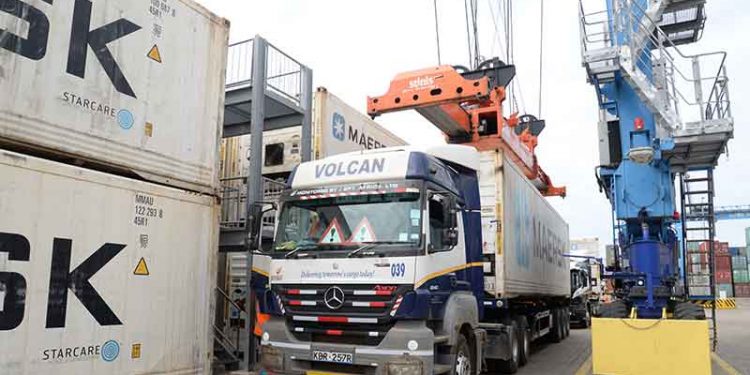South Sudan has asked the Uganda Revenue Authority (URA) to start implementing the Electronic Cargo Traffic Note Certificates (ECTN), which will add another element of costly regulation to be borne by importers and transporters, increasing the cost of using the Northern Corridor.
Shippers and Truckers will incur extra charges in importing or exporting goods to South Sudan after Juba directed the border authorities in Uganda to start implementing ECTN in all transit goods.
The new measure by South Sudan implies that all goods to this landlocked nation from either the port of Mombasa or Dar es Salaam through the border points of Kenya and Uganda will have to be issued with ECTN at a cost of up to $110 depending on the size of the cargo.
A truck carrying a 20- foot container will pay $80 while those transporting 40-foot will incur a cost of $110 to have the goods cross to or out of South Sudan. Vehicles will be levied between $75 and $100.
Drivers violating this directive will be fined between $10,000 and $500,000 depending on the nature of goods in transit, according to the South Sudan Ministry of Transport.
The purpose of ECTN is to prevent diversion of cargo and smuggling of goods on transit as it monitors how the consignment is moving from the port of entry to the destination.
The move comes as a blow to truckers who are yet to recover from the losses occasioned by the suspension of operations to South Sudan recently due to cases of insecurity that saw several truck drivers killed by unknown assailants along the Nimule – Juba highway.
The operations have, however, resumed after the government of South Sudan assured Kenya and Uganda that it has deployed security along the troubled highway to offer protection to truckers.
The charges are contained in a circular dated December 18, 2020, signed by South Sudan’s Minister of Trade and Industry Kuol Athian Mawien.
It reads, “All transporters, companies, shippers and freight forwarders, road carriers, importers and shipping lines, airlines and other involved into the transport either for goods import/export or in transit from and to South Sudan will have to comply with all requirements of the trade facilitation system implemented by South Sudan.”
“The entities concerned are required to ensure the strict application of this circular/letter. If the ECTN is not presented and failing to comply you are exposed to the sanctions provided by South Sudan regulations and in this regard, fines from $10,000 to $500,000.”
The implementation of the directive caught transporters by surprise, Kenneth Chemase, a liaison officer and agent for Kenya International Freight and Warehousing Association at the Malaba-Kenya-Uganda border, told the EastAfrican this week.
“That is a report we received from URA that they will soon start implementing the ECTN and some fees will be paid. But we are yet to be told how much the fee is and when it will be implemented. That is new information that we have just received. Actually, the implementation is yet to start.”
Cargo clearing agents at the Malaba-Kenya-Uganda border, too, said they were not aware of the new conditions to South Sudan.
East African Business Council chief executive John Bosco Kalisa said the ECTN was already being implemented in the region and that only South Sudan and the DR Congo were yet to implement it.
“We are planning to hold discussions with all the stakeholders including the revenue authorities and the freighters to educate the truck drivers on the need to implement it,” Mr Kalisa was quoted by press recently.
“So, the truck drivers should continue with their work as we wait to meet all the partners involved in the matter.” Mr Kalisa was clarifying what appears to have been a verbal order by the URA to border officials to implement the ECTN.
He clarified that the ECTN is not a trade barrier. “The purpose is to prevent diversion of cargo and smuggling of goods because it monitors how the cargo is moving if there are roadblocks and if there are issues related to an NTB,” said Kalisa.
ECTN is coming at a difficult time amid insecurity concerns at the Uganda-Kenya-South Sudan border.
Increasing cost of business aside, insecurity affecting commerce in South Sudan has dogged regional businesspeople for a while now with no solution in sight as the government there is blaming armed groups which they are accusing of disrupting trade with its neighbours.
This week proved just how much it is costing the region to conduct trade with South Sudan when Uganda’s Information, Communication, National Guidance Minister Dr Chris Baryomusi said President Yoweri Museveni and his South Sudan counterpart agreed to deploy drones along the highway to Juba.
This is on top of Juba’s deployment of its army and police as the government seeks to end armed attacks on the Nimule-Juba highway. The Sudan National Police Service (SSNPS) and South Sudan People’s Defence Forces (SSPDF) have been deployed on the Juba-Nimule highway.





